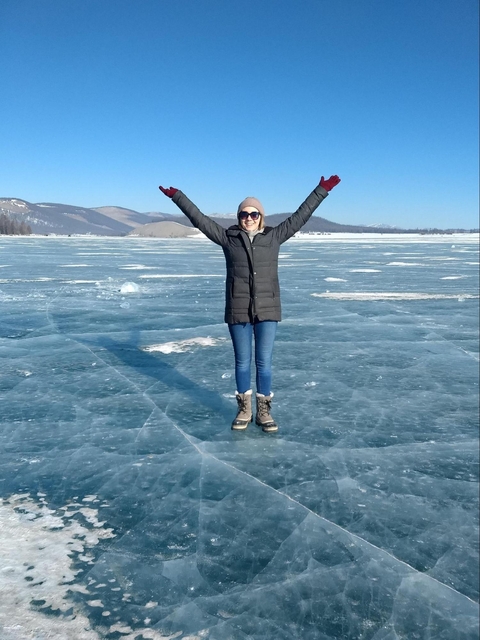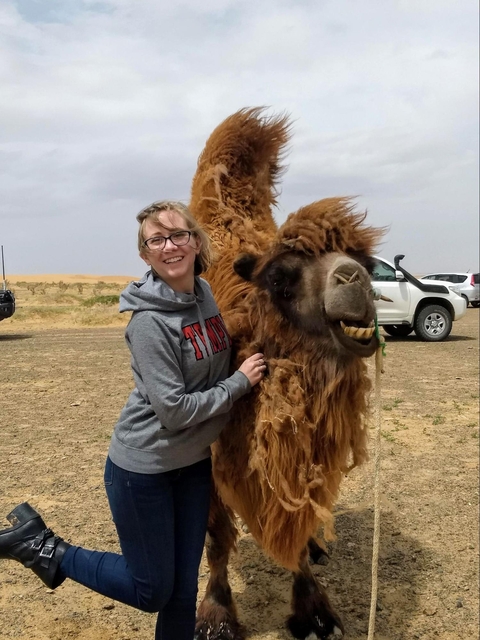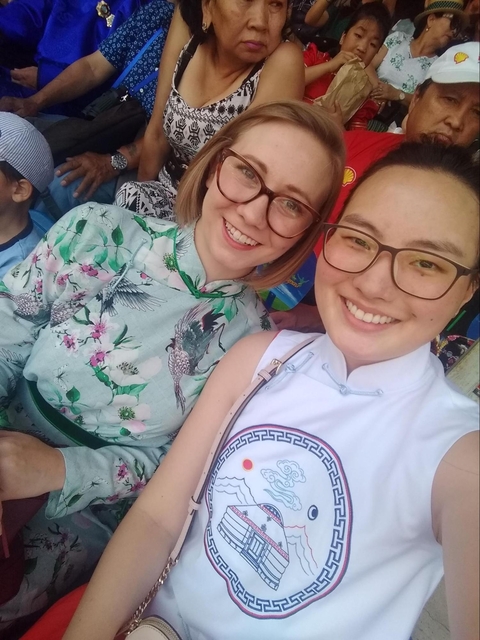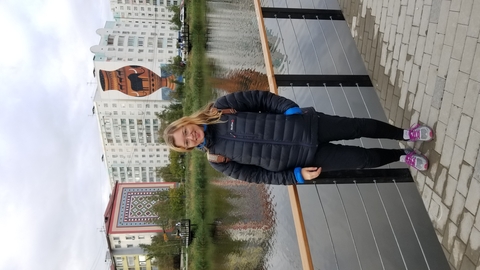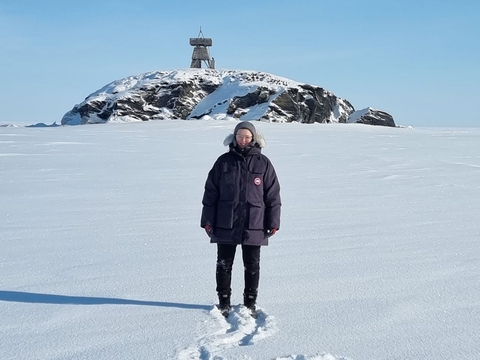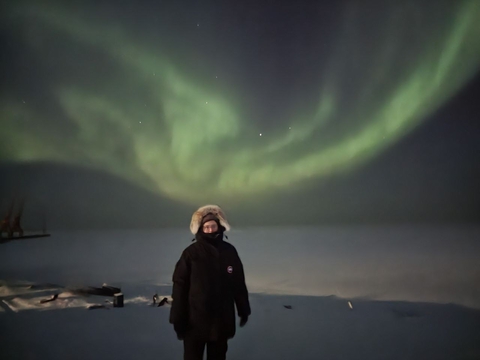
Directed Independent Language Study (DILS) at Yale Center for Language Study provides undergraduate, graduate and professional school students the opportunity to study a language that is not taught in a Yale classroom. The list of languages Yale students choose to learn is quite long and includes, for example, Bulgarian, Inupiaq, Kinyarwanda, Punjabi, and Yiddish. Some languages, first studied through DILS, have entered regular Yale curriculum, taught by faculty through programs in departments and area studies councils. Two European Studies Graduate Fellows share their experience of learning a language with DILS.
Maggie Lindrooth is an MA student in the European and Russian Studies Program who learns the Mongolian language.
How did you learn about DILS? How long have you been studying with DILS? Why do you think it is important to have this opportunity?
I learned about DILS through the Center for Language Study here at Yale. I reached out to CLS to inquire about possible resources for studying Mongolian, and they advised me to apply for the DILS program. I applied this past fall (2022) for Spring 2023 funding and have now been studying with DILS for the last two and a half months. This opportunity is incredibly important to my academic path and future career, as my research focuses on Mongolia and will require extensive fieldwork in the country. Because of this, high-level language skills are absolutely necessary for success. However, Mongolian is only taught at a few institutions in the United States, and demand for classes is relatively low. DILS has allowed me to continue studying Mongolian, which would otherwise be impossible. The program is, in my opinion, one of Yale’s most important resources for students who are interested in studying less common languages and regions. Without DILS, I would be much further behind in my own language capabilities and, therefore, my research.
What language do you study with DILS? Is it a new language for you, or did you have previous knowledge of it?
I study Mongolian with DILS. I had previously studied Mongolian while I was living in Ulaanbaatar, Mongolia’s capital, from 2018-2019. While I was in the country, I reached an intermediate level of proficiency. However, since returning to the United States at the end of 2019, I haven’t had many opportunities to practice the language. DILS has helped me not only regain some of the knowledge I had before, but also expand my understanding of grammar, vocabulary, and even the cultural context that is so important to language learning.
Why do you study the language? How is it helpful for your research? What else do you learn in your sessions about the region?
I study Mongolian for many reasons, both personal and professional. Personally, I have a deep affinity for Mongolia and the Mongolian people, and many friends and former colleagues in the country. Professionally, I am an aspiring socio-cultural anthropologist focusing on Mongolia and gender, cultural and national identity, and post-socialist memory in the twenty-first century. Knowledge of Mongolian is absolutely essential for conducting fieldwork and archival research in the country, both now and once I begin a PhD program. During my sessions every week, my instructor provides me with texts that detail different aspects of twentieth-century Mongolian history including the socialist period and the transition of the 1990s. These texts not only challenge me and help me develop linguistically, but also provide vital context for my own research and continued language learning.
Who is your instructor? How did you find them? Tell me more about relations you developed with your instructor though DILS.
My instructor is Tserenchunt Legden, Senior Lecturer of Mongolian at Indiana University Bloomington. Vee Cangiano, DILS Program Director, connected with her after we both struggled to find a Mongolian instructor in New Haven. Tserenchunt is incredibly patient, helpful, and understanding, and clearly takes my interests and language learning goals into account when developing lesson materials. I enjoy hearing her perspectives on not only Mongolian language but also the country’s twentieth-century history with socialism and am grateful for her support.
How are you going to use your language skills in the future?
I look forward to using my language skills to conduct fieldwork in Mongolia, communicate with friends and colleagues, and enrich my own knowledge of Mongolian culture and history. As I continue to improve my knowledge of Mongolian, I look toward the future with excitement at the possibilities, both academic and professional, that await.
Is there anything else you would like to add about your experience with DILS?
DILS is an incredible resource, and I wish more people knew about it! The Center for Language Study has so many opportunities for undergraduate and graduate students, including DILS, and I want to tell everyone I know to take advantage of it. Having support for the study of less-commonly (or even very uncommonly) taught languages is so important, and I hope that more students continue to participate in DILS in the future.
Elena Adasheva-Klein is a PhD Candidate in Sociocultural Anthropology who studies the Sakha language with DILS.
How did you learn about DILS? How long have you been studying with DILS? Why do you think it is important to have this opportunity?
I came across DILS when browsing the Center for Language Study programs on their website. I started studying with DILS in the Fall of 2022 after coming back from my fieldwork in the Republic of Sakha (Yakutia) and continued in the Spring 2023. Studying the Sakha (Yakut) language is very important for my academic work and personal development. I do not think that courses in Sakha are offered anywhere in the United States, so having this opportunity and institutional support has been critical for my language acquisition.
What language do you study with DILS? Is it a new language for you, or did you have previous knowledge of it?
Sakha is an Indigenous language of Siberia, spoken by Sakha people and other Indigenous groups in the Republic of Sakha (Yakutia) in Russia. I have taken private classes with my instructor prior to my dissertation fieldwork, and then continued my studies with DILS.
Why do you study the language? How is it helpful for your research? What else do you learn in your sessions about the region?
I have conducted my fieldwork in the Northern Yakutia where the Sakha language is spoken, together with Russian. It is important for my scholarly work to have at least some knowledge of the languages people from the region speak. As a native Russian speaker working in Siberia, I also wanted to show my respect and appreciation of Indigenous knowledge and enormous cultural heritage of Sakha and other Indigenous peoples, living in the Sakha Republic. During sessions with my language instructor, I learn about Sakha cultural and ecological practices and the history of colonization. I am very much interested in reading rich literature written in Sakha by Indigenous writers, specifically prose and poetry about the North. I feel that my own experience of taiga and tundra (two biogeographical zones in Yakutia) help me to connect with Sakha literature on a deeper level. My instructor always says that Sakha is a very visual, almost cinematic, language where images are drawn in words. Being a visual thinker, I find this quality of the Sakha language very helpful. Another aspect of language learning has been a better understanding of Sakha culture and spirituality. Though I am not a traditional anthropologist with a focus on ethnic groups, this appreciation of local cultures informs my writing about human-environment relations in the Siberian North.
Who is your instructor? How did you find them? Tell me more about relations you developed with your instructor though DILS.
I was very lucky to meet my language instructor and colleague, Dr. Vera Solovyeva at the Arctic Futures 2050 conference in Washington, D.C. in 2019. Dr. Solovyeva received her degree from the Environmental Science and Policy Department at George Mason University. In her own words, her work explores “how Indigenous peoples preserve and develop their cultures and traditions in a contemporary world that is rapidly changing under the pressure of factors such as globalization and climate change.” Dr. Solovyeva also works with museums and international organizations. She co-organized multiple visits of traditional masters from the Sakha Republic to the American Museum of Natural History (AMNH) in New York and Sakha cultural events in California. Dr. Solovyeva advocates for social justice and the Empowerment of Indigenous women at the UN Permanent Forum on Indigenous Issues and the Global Alliance of Indigenous Peoples, Gender Justice, and Peace.
I asked Vera to say a few words about her approach to teaching the language. She says that the language comes to life only with the understanding of cultural subtext and traditional beliefs, embedded in words and descriptions of natural phenomena. For Vera, it is important to teach not only spelling and grammar, but also the worldview and socio-cultural context of peoples who speak the language. In our sessions, we, for example, devoted some time to translation and cultural interpretation of songs about northern nature, written by Indigenous (Even) poet, Oleg Ivanov.
How are you going to use your language skills in the future?
One of my goals for future research is to focus on Sakha literature from the northern regions. Due to multiple waves of colonization, northern Indigenous peoples of various origins (Even, Evenk, and Yukaghir) often speak and write in Sakha and Russian. The northern literatures, written in Sakha, communicate very specific relations between people and tundra, the sea, the sun, the northern lights, rivers, snow, and animals. Reading and contemplating Indigenious “nothern texts” inform my scholarly work and understanding of human presence in the North in the ways that writings in Russian or English do not. Another topic I would like to master is the history of the Sakha language as it embodies the history of Russian and Soviet colonization of Siberia.
Is there anything else you would like to add about your experience with DILS?
I am very grateful for the opportunity to study the Sakha language with DILS. Vera and I are very lucky to have Vee Cangiano, DILS Program Director, supporting our work. I also believe that studying Sakha at Yale puts the Sakha language on the map in the American academic context, which may facilitate a wider interest in the Sakha and other Indigenous languages of Siberia in the future.


